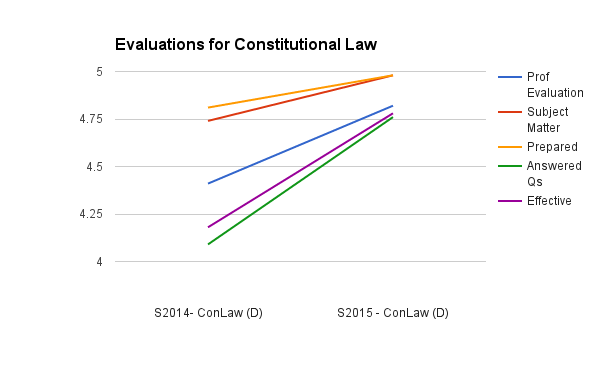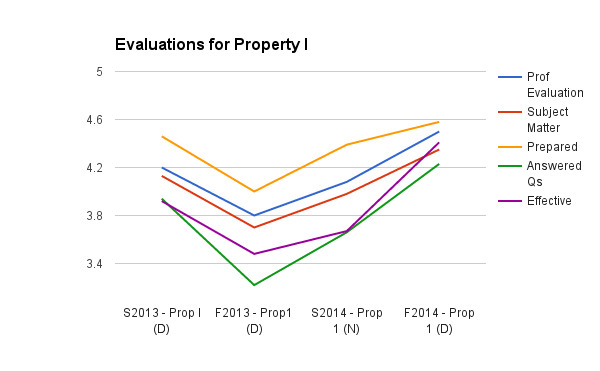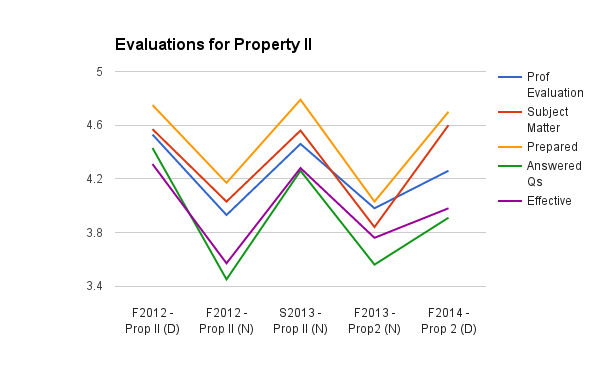Following from my posts after my first and second year of teaching, here are the syllabus, examinations, lectures, and evaluations for the four classes I taught this academic year:
Fall 2014
Spring 2015
- Constitutional Law: Syllabus, Exam, Evaluations, Lectures
- Advanced Constitutional Law Seminar: Syllabus, Evaluations, Lectures
Overall, I have been very pleased with my improvements in teaching. I’ve noticed a few shifts in the comments. First, During the first, and to a lesser degree second year, many of the comments focused on my substantive skills–that I did not know the material well enough, that I did not explain the material well enough, that I wasn’t effective at answering questions, etc. These remarks killed me, but I knew they were (mostly) accurate–I say mostly because the perception of being “new” creates the not-always-accurate bias that I don’t the content (and I was brand spanking new!). Fortunately, those substantive comments have trickled out. My evaluations from my third year for Property I, Property II, Constitutional Law, and a Federalism Seminar, had very few critiques on the substance. The metrics that seems to be the most useful–answers questions effectively–has steadily increased. My scores for the four classes I taught during the 2014-15 year were 4.23 (Prop I), 3.91 (Prop 2), 4.76 (ConLaw), and 4.67 (Seminar). These were the highest to date. In years past I averaged in the mid-threes. Likewise, my scores for “knowledge of subject matter” were 4.35 (Prop I), 4.6 (Prop 2), 4.98 (ConLaw), and 4.87 (Seminar) were much higher than in the past when I averaged high-threes. It may sound easy to master a subject when taking the exam, but mastering the teaching of a subject frankly isn’t. It can’t be accomplished in one semester, or even one year. I’ve worked hard to learn it so well that I can teach it well. I think I finally hit my stride in the third year.
Second, curiously, now that the substantive comments are fading out, a lot of personal comments have faded in. In particular my remarks during the Fall 2014 semester for Property I and II had a small, but distinctive number of students who simply didn’t like me. They thought I was rude, pretentious, and inconsiderate. I’m hoping these were outliers because I had never seen those before, and they didn’t repeat during the Spring 2015 semester. There is an odd phenomenon, which my colleagues have confirmed, where a few malcontent students promote a perception of professor, which echoes throughout the section on social media (they have section facebook pages, which I deliberately avoid), so much so that many students write almost the exact same comment, verbatim. It’s fascinating to look at the patterns. In any event I take the comments seriously, and I don’t want students to think that way about me. In any event, if they are focusing on me, and not my teaching, then I’ve done what I need to do.
Third, an apparent trend is that my scores in ConLaw have, as could be expected, quickly eclipsed my progress in Property. This is a mixed blessing, as I will explain. I was hired to teach Property alone, and understood that. ConLaw only opened up after a Professor took Emeritus status, and two Professors passed away in the same year, so there had to be some shifts in coverage. Now, for the foreseeable future, I will likely teach two semesters of Property and two semesters of ConLaw each year. Even so, I take seriously my ability to effectively teach a class, which admittedly, is not my primary area of expertise. Frankly, students don’t care what you like to write about. What exacerbates this problem, for me in particular, is how high profile my constitutional law interests are, in light of my book, blog, speaking, etc. A decent number of my comments in Property says something like “I wish I could take him for ConLaw.” Those aren’t too bad. A smaller number say “He should be teaching ConLaw instead of Property.” Those are not good. In the absence of my ConLaw expertise, those comments would disappear, and my Property evaluations would be buoyed. But in any event, I still strive to bring the same passion I have for ConLaw to all of the classes I teach.
Since I started teaching in 2012, I’ve kept a detailed spreadsheet with all of my scores and comments. I hesitated drawing any patterns or trends prematurely, but with six semesters, and twelve total classes completed, I feel more comfortable in assessing my progress. Also, this year I was promoted from Assistant to Associate Professor, and am grateful for the (literal and figurative) vote of confidence by colleagues. I measure the progress along what I see as the five most important metrics on the evaluation: (1) overall professor evaluation (average of all other scores), (2) knowledge of subject matter, (3) preparation, (4) answered questions effectively, and (5) effective as a professor. The last two are probably the most critical.
I’ve only taught ConLaw twice, but so far I have been extremely pleased with my progress. You can read some of the comments for a sample, but on the whole the students are really, really happy. 98% of the students gave me a 5 for command of subject matter, enthusiasm, and preparation (One refusenik gave me a 4 for each question). 
Forty-four of the sixty-four students that filled out evaluations offered written comments, and they were overwhelmingly positive. The written comments matter far more to me than the numerical scores.
Several students wrote that this was their favorite class, and praised my enthusiasm. These remarks bring me more contentment than I can measure:
- By far my favorite class of the year! Really valued your knowledge and enthusiastic attitude on the subjects! Learned os much!
- The subject matter itself is difficult. Blackman’s enthusiasm transfers to the students.
- Professor Blackman is the “model” by which all professors of law should base their class organization, presentation style, knowledge and enthusiasm of the subject matter, and accessibility. Professor Blackman is a TREMENDOUS asset for South Texas College of Law.
- I really enjoyed the class–always engaging.
- I enjoyed Professor Blackman’s class and his obvious passion and enthusiasm for the subject
- No professor cares more about the subject that they teach than Professor Blackman! His passion stimulates learning and encourages people to be engaged on a deeper understanding! Will take Professor Blackman in every course he teaches going forward! Great class!
- Very enthusiastic. Made it easier to pay attention and stay engaged.
- You were an amazing professor and I look forward to taking more classes from you in the future.
- His enthusiasm and general passion for the subject made it easy to learn and appreciate the class.
- Favorite class this semester. Wonderful time. Thanks!
- Best professor I have had. Knows the material very well. Engaging, fun and interesting class.
- Made the subject matter very interesting.
- I came in here thinking I wouldn’t like this class but it has turned out to be my favorite. You did a great job teaching the material! I’ve probably learned more in this class than any other in law school, thus far!
- Blackman is impressive in his teaching style, knowledge of material, and effectiveness in commanding the course. I am happy I have taken COnLaw from him and will hopefully take other courses taught by him.
- Great teacher: very passionate about the subject and knowledgeable about all areas surrounding the dates and times pertaining to the Constitution.
- Overall one of my favorite classes/professors. Prof. Blackman was an excellent professor who is extremely knowledgeable about this information. He did a wonderful job presenting the material in a way that was easy to learn and understand. I loved the structure of the course and the wide array of topics we covered. Highly recommend Prof. Blackman.
These last three brought tears to my eyes.
- This has been my best experience in law school thus far. I have grown as a person, as a future lawyer, and most importantly as a contributing citizen of my state and country. Prof Blackman is inspirational and very intelligent. I thoroughly enjoyed this class and will recommend it to my fellow students.
- There have been few times in my life as a student that I’ve been inspired by a professor. This is one of those times. Prof. Blackman sparked my interest in the Constitution. I looked forward to attending class every day and I never felt bored or disinterested. Prof. Blackman is at the cutting edge of constitutional issues and I am so grateful to have had him as a professor.
- By God, the man has passion for the constitution. This class made one of the most fascinating subjects even better. I learned something new every day. I’m grateful for this class, I feel lucky.
One student praised me for staying on schedule.
- The course was very well conducted. I love how he stayed on the schedule. Stimulating discussion. Challenging but interesting.
This is something most students never appreciate, but something I pride myself on. At the beginning of the semester, the syllabus lists what will be covered in each class, and I never fall behind. It hasn’t happened in three years. One of the things that drove me nuts in law school was a professor who never stayed on schedule, and said “read 20 pages from where we finished.” Staying on schedule requires a lot of discipline and planning, and classroom clock management skills. I pay very close attention to the time, and adjust the pace accordingly. Sometimes I slow down, sometimes I speed up. Critically, if we start a case on Thursday, we finish it on Thursday, rather than trying to continue it midstream on Tuesday when no one remembers what we were up to. Cognitively, learning in units is very effective. It pays dividends the students will never even realize.
There were a smattering of negative comments.
Three students commented about the format for my final exam. I give a two question massive fact patterns, with a word limit.
- Prof. Blackman, you are brilliant. Your command of the material, content and course are inspiring. That said, I fear your exam will be as lethal as the one from Harvard in 1900. Please don’t do that us.
- Having a two question final does not adequately demonstrate our knowledge of constitutional law. It is a hit or miss final.
- Like the Prof and Class but the format of the final is ridiculous.
This year the ConLaw exam was probably the toughest exam I’ve ever given, and for the most part, the students rose to the occasion.
I offer the word limit to ensure that all students have the same canvas to work with, and don’t reward some students who can write thousands of words, hoping to occasion onto the right answer. I used to use a 500 word limit in Property and a 1,000 word limit for ConLaw. After some further deliberation, next year I will use a 1,000 word limit in Property as well. Very few students in ConLaw seemed to complain about that limit, so it will make the students more at ease.
One comment I used to get a lot more, but not as much now, is that I speak too quickly.
- Excellent class. Only minor comment is that he wants to get so much information out at once that at times it can be incomprehensible. Real motor-mouth. Extremely knowledgeable.
This is something I’ve worked on. Slowing down my New York cadence for Texas sensibilities has been tough, but I’ve gotten better. The trick is to take more pauses. Even if your words don’t come out slower, by giving a break between clauses, the brain can reconstruct what was said. Trust me, it works.
Three out of 64 comments concerned bias.
- I would appreciate if teachings weren’t so one-sided. I don’t have enough time or space to go into detail. Include the whole truth. Blackman was very knowledgeable but left import details out of his teaching.
- I love your enthusiasm and passion for the subject. It makes it more interesting and easier to learn. I do feel like there are portions of the class (Obamacare or DAPA/DACA) that felt like there was a political sway, but I understand that is part of what comes with your sincere passion.
- Knowledge is impressive. I think you did a good job of balancing your perspective. But I think it is uncalled for to suggest that people should restrict their activism to the ballot box. It sounds like you are trying to “keep people in their place.”
This last comment made me chuckle. A point I try to make in class is that democracy, and not the courts, should (in most cases) be a preferred method for social change. This is a concept so foreign to law students, who are nursed on judicial power, and know very little about the legislative process. But if I am faulted for favoring Article I over Article III, guilty as charged. Relatedly, students have a warped view of executive power, due in no small part to the mantra of the current presidency. At one point when talking about immigration, I said what should the President do if Congress refuses to pass a law he wants. The student replied, sincerely, issue an executive order. I cringed.
As readers of this blog are no doubt aware, right of center professors–especially those teaching constitutional law–are quite rare in the legal academy. I can probably count all of the Federalist Society members that teach ConLaw not at George Mason on my fingers and toes. I’ve worked really hard to avoid the appearance of bias, but this is especially difficult because of my reputation–I walk into class bearing a scarlet R. This is especially true in ConLaw, where I often appear on local radio and in the local media talking about the Supreme Court. My strategy has been, thus far, has been to go out of my way to cover in depth the side I disagree with. I always let students who disagree with me speak uninterrupted (even when I would otherwise interrupt a student I agree with who goes off topic). And in a few cases where my views are really well pronounced (Obamacare, DAPA/DACA, etc.), I tell the students my priors. I can’t hide them, so I don’t run from them.
Although a few students also wrote that I allowed both sides to speak, which was reassuring.
- Obvious command of ConLaw knowledge combined with enthusiasm for applying ConLaw to current issues kept class interesting. He allows students to disagree, which helps examine ideas.
- Professor Blackman did not evade “hot topics.” His passion for constitution and the liberty it provides allowed class discussions to be honest and productive in light of Constitution. Loved the class!!
- Excellent professor and you did a fantastic job of being sensitive and respectful during discussion of controversial topics.
It’s true. We discuss topics like abortion, same-sex marriage, sterilization, internment, slavery, and many others. Contrary to what is an unfortunate trend in education, on the first day of class I promise my students I will offend them at some point, and urge them to change sections if they don’t want to be offended. We deal with sensitive topics, and I try to do so in a respectful manner, but I will not shy away because it may make people uncomfortable.
Curiously, what perplexes me is that a few Property students commented I’m biased! These boggle my mind. There is very, very little in Property that is susceptible to ideology. My working hypothesis is that I am generally a formalist–especially in a common law class like Property–and prefer the Restatement (First) to the Restatement (Second) or (gasp!) Restatement (Third). This may be alien to a lot of students who are perhaps otherwise trained to adore whatever the California and New Jersey Supreme Courts write about the common law. (I often tell my students if the book has a case from California, they are about to reverse the common law because fairness).
My evaluations from Property I are generally trending upwards. I (somehow) did really well my first semester, when in truth I felt least prepared. I think the students pitied me, as I cratered the following semester. But since then, I’ve been trending upwards. Property I is the hardest class to teach in my package (future interests!) so I’m pleased the numbers are improving.
My Property II scores are erratic–up, down, up, down, up. This graph perplexes me the most. It’s not a night and day divide either (I indicate night classes with (n) and day classes with (d)). Sometimes the night students like me better, and sometimes the day students like me better. This graph confounds me because I know–at a minimum–I have a much better grasp of the subject matter each semester, yet the red line bounces around with the class averages. One other related problem, that is beyond my control, is that students perceive the topic on the Takings Clause in Property as teaching ConLaw, and get frustrated–teach property they say! That is property, and it is in the curriculum for Property II, so deal with it. In any event, I am teaching Property II this fall, and hope to get the trend upwards. I’m not happy with these inconsistent scores.
Overall, my numbers are trending upward over all of my classes, though it is difficult to compare different course–apples to oranges.
I will report back this time next year with my reflections after four years of teaching.


